Showing 37–48 of 96 results
-
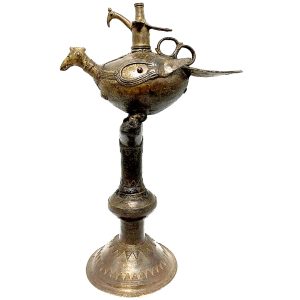
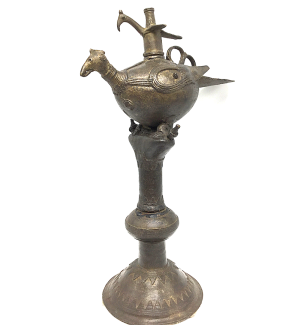
$365.00
H: 13″ W: 8.5 ” D: 4.75 ” | FREE SHIPPING!
This graceful brass oil lamp is topped by two peacocks, a large one that held oil and a smaller one decorated with striated lines. sitting high on a thin mount with a spiral base. It was used for Hindu prayer rituals (puja) in the home or at temples and for devotional worship. This fine lost wax lamp with a soft patina is a one-of-a-kind piece. Often used in Hindu religious sculptures, peacocks have a strong religious tradition and represent harmony, joy and beauty and the time cycle.
-
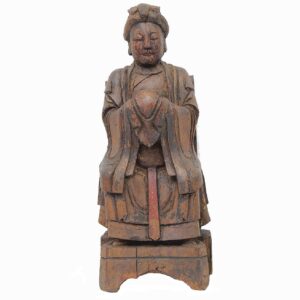
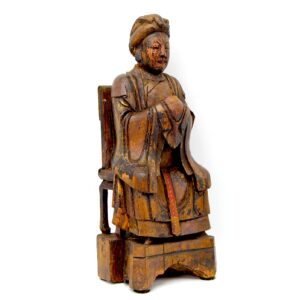
$425.00
H: 9” W: 6.525” D: 2.5 | FREE SHIPPING
This home devotional image, finely carved in the front and back, represents Mazu, the most revered Taoist female deity in coastal areas in mainland China, Taiwan and Vietnam. She sits in a traditional Taoist deity pose, hands covered by a ritual cloth with a space to hold a hu tablet on a plain armless high back chair. She is a provincial matronly figure, eyes calmly cast down, in humble attire with characteristically small feet, a hanging red, and a modest hat with a flat phoenix.
-
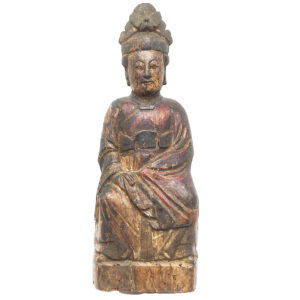
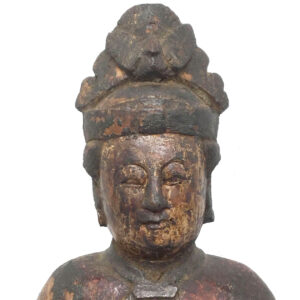
$395.00
H: 12.5” W: 4.875” D: 3.375” | FREE SHIPPING!
Finely carved from one piece of dense hardwood, this Queen Mother of the West image sits in a traditional pose on a backless throne with a large iconic phoenix on her hat and wearing in a graceful robe with two fingers of her right-hand holding a long sleeve that covers her left hand – common in Taoist deity images. It was brightly painted as seen by her red garments under a lacquered cover that naturally darkened over time from incense and candle offerings. Her carved facial features with pursed lips depict a caring, authoritative matronly figure.
-
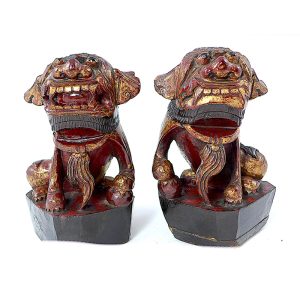
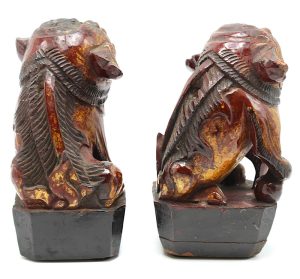
$395.00
H: 5.75″ W: 3.25″ D: 2.75″ | FREE SHIPPING
Each of this whimsical gold and red-burgundy lacquered pair of male fu lions sits erect on a high pedestal heads thrown back with flaring ears and bulging eyes, decorative stylized manes and a small bushy tail. Their spirituality is displayed by the pair silently emitting the blessed mantra “aum”: the open mouthed lion forming an “au,” and the other completing it with a closed mouth to form “mmm.” The workmanship on these pieces is masterful, although rustic and provincial, and they are rare with their Buddhist symbolism and because most pairs of carved fu lions were lost during China’s modernization.
-
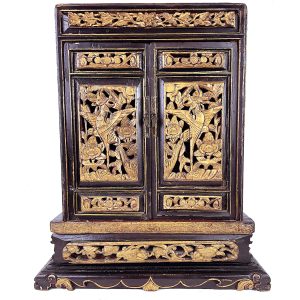
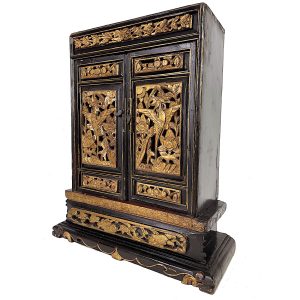
$595.00
H: 16.375″ W: 13.625″ D: 5.75″ | FOR SHIPPING INFORMATION CONTACT US AT 213-568-3030
This intricately carved black and heavily gilt antique cabinet is a fine example of a Straits Chinese furniture made in Guangdong for the Southeast Asia market. Carved openwork panels with phoenixes and lotuses are symbolic wishes for harmony, blessings, rank, good fortune; outstretched wings wish for harmonious marriage, many sons and the inside decoration a wish for status and successful career. Although flamboyant for todays taste, it is a unique accent piece and gift for newly weds.
-
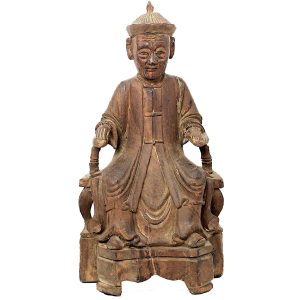
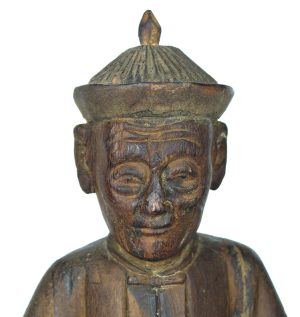
$850.00
H: 12.75” W: 6.625” D: 5.75” | FREE SHIPPING
This masterfully carved ancestor as a mandarin official sits on horseshoe chair set on a footed high decorated plinth dressed in a well-appointed formal 3-button Mandarin long coat and pointed rattan hat. His face is uniquely and unusually individualized with heavy lidded eyes, in a benevolent expression and his advanced aged indicated by the wrinkles clearly depicting a loved individual. This exquisitely carved image in excellent condition with a fine patina was true homage to a revered family member and is one of our finest ancestor figures.
-
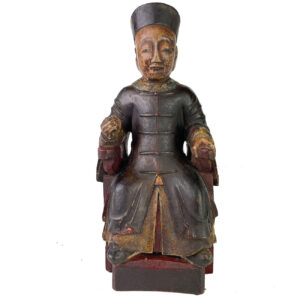
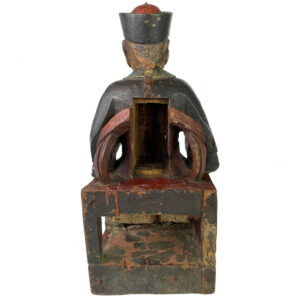
$455.00
Ht: 8.5″ W: 4″ D: 3.375″ | FREE SHIPPING!
This small fine quality piece depicts a modest ancestor figure as a Mandarin official seated in a horseshoe chair on a raised pedestal emphasizing his importance wearing the traditional mandarin 5-button long coat with a round collar, a plain officials hat, and an undergarment extending to the top of his black shoes. He has a somewhat personalized oval-shaped tranquil face, a high forehead with curved painted brows, a hint of a smile on his pursed lips, and a triangular pigtail down his back.
-
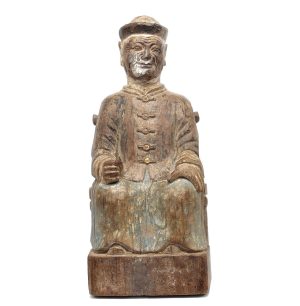
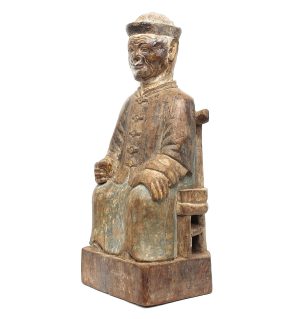
$595.00
H: 11.5” W: 5” D: 4” | FREE SHIPPING!
This well-carved and remarkable ancestor figure is a lower-level Mandarin Civilian official seated on an armless yoke-back chair mounted on a plain rectangular base. He wears a traditional Mandarin jacket, an ankle-length skirt and a black velvet cap for winter or rattan woven hat in summer. His left hand is on his knee while the clenched right rests on the other one in an iconic Mandarin official pose. He is extremely well-carved with facial details showing his advanced age and he exudes an air of authority and status. In contrast to idealized ancestors, he is more individualized reflecting aspects of the actual person portrayed.
-
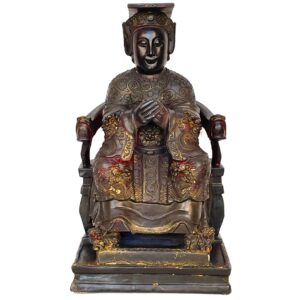
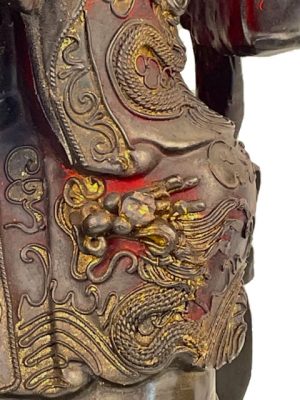
$1,050.00
H: 15.375” W: 8.625” D: 7.5” | FOR SHIPPING INFORMATION CONTACT US AT 213-568-3030
This Mazu, the protector of sea farers, is portrayed as the imperially sanctioned “Empress of Heaven” seated on an elaborate horseshoe shaped dragon throne, hands clasped symbolically holding a hu tablet, adorned with elegant dragon robes, an official’s girdle, a flat-topped Empress headdress and small feet resting on a pair of gilt fu lions. Meant to be seen from all sides this beautiful carving is decorated on front and back.
-
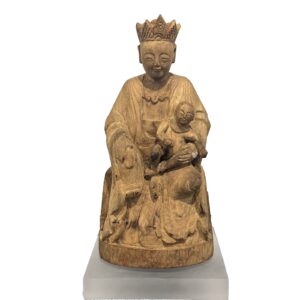
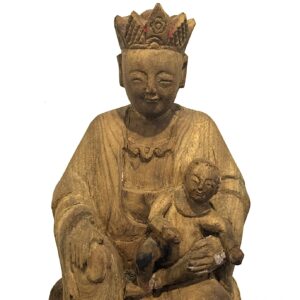
$1,350.00
H: 11” W: 5.75” D: 5.125” | FREE SHIPPING
This very rare and fine 16th century home shrine image displays the benign and compassionate countenance of Songzi Guanyin the “Bestower of Children.” She traditionally holds a male child in her lap facing out to her devotees to assure assistance to the hopeful parents to become pregnant, protect the mother’s pregnancy and the child after birth. She leans slightly forward, with delicate facial features with a sweet smile, wears a 5- lobed crown centered with a camellia flower a Chinese symbol of young sons and daughters. With round face and joyful half-closed and eyes, she looks lovingly at the child whose arm is draped over hers. The inscription on the back dates the pirce to 1521-1567
-
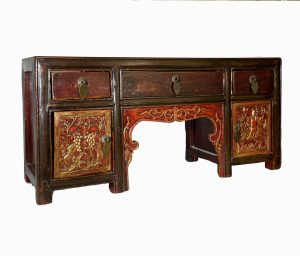
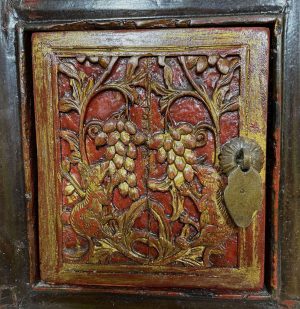
$485.00
H: 9” W: 18.5” D: 5.875” | FOR SHIPPING INFORMATION CONTACT US AT 213-568-3030
As a wish for a prosperous and healthy family with many sons, this small table elegant probably was in a young couple’s bedroom to hold small personal statues and store precious items. Guanyin sits a hǒu holding lotuses in the right panel and the left has fertility symbols rats with melons. It. is perfect for creating a personal home altar and a unique wedding gift.
-
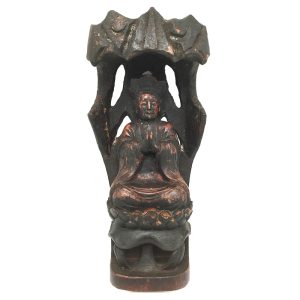
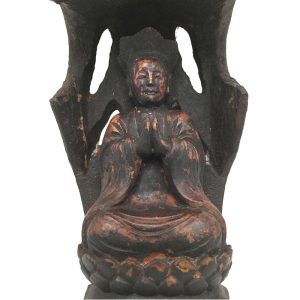
$425.00
H: 11.75” W: 5.25” D: 4.75” | FREE SHIPPING!
In this provincial carving for private devotion on a home altar, Nanhai Guanyin sits in tranquilly in anjali mudra at her cave home on Putuo on a lotus throne set on an open lotus framed by a backdrop arch of openwork with pierced cut outs. She wears a five-lobed crown and flowing robes symbolizing her regal status in contrast to her modest robes. Few small Nanhai Guanyin figures have survived, and they are highly prized. In feng shui, Guanyin statues should be in the center of the home to bring blessings to the entire home.
End of content
End of content























